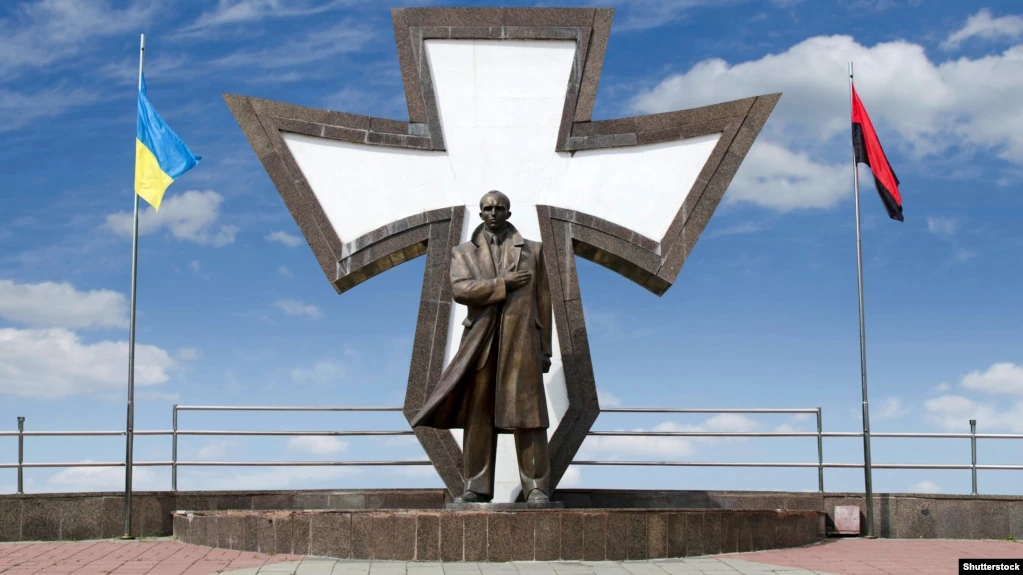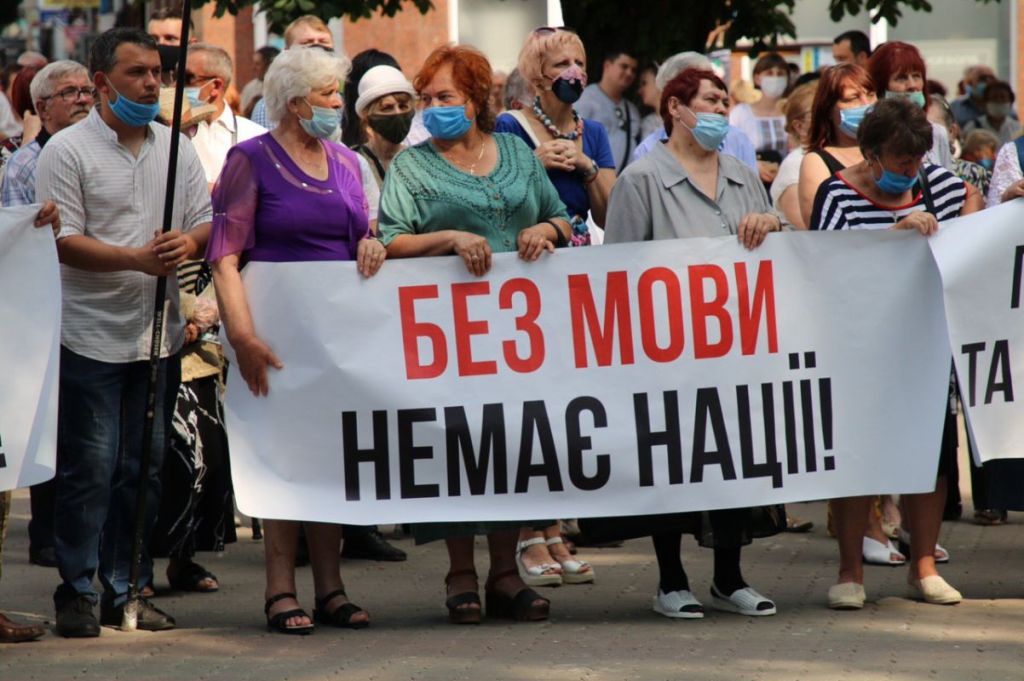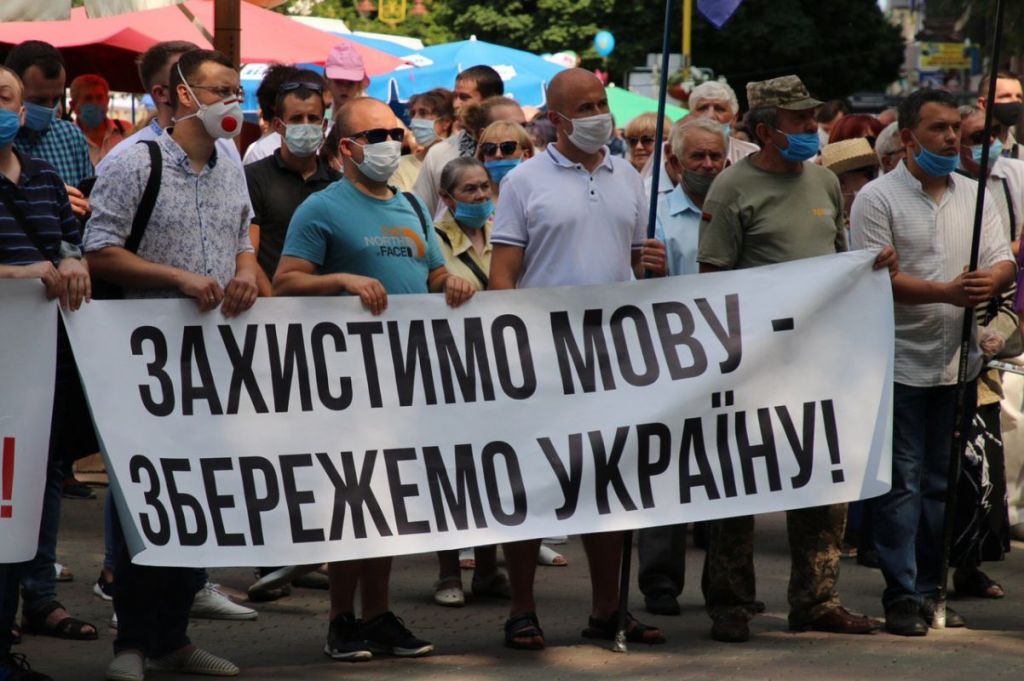
To the Left: The National Flag of Ukraine.
To the Right: UPA Flag (Ukrainian Nationalist Flag)
The Western region of Ivano-Frankivsk is about as pro-Ukraine as it gets. Red and black nationalist flags are regularly seen around the city. Stepan Bandera, a controversial Ukrainian nationalist figure from the WWII era, is beloved. And unsurprisingly, it is one of the few regions in Ukraine where you won’t hear any Russian at all.
At least, that was the case before the war. But now with an influx of displaced people from the East, more and more Russian is being spoken in one of the most anti-Russian regions in all of Europe.
If you have been staying updated on Ukraine, you probably know by now that Russian is the main language in the East. What’s important to point out is that at least before the war, Russian was very commonly spoken in Central Ukraine, and even in some Western regions you could occasionally hear some people speaking Russian.
That was absolutely not the case in Ivano-Frankvisk. As of 2001 (aka the most recent time there was a census in Ukraine), 97.5% of respondents identified as Ukrainian speaking, with less than 2% in the Russian-speaking camp. While many Ukrainians are ditching Russian completely because of the war, Ivano-Frankivsk to say the least has been ahead of the curve in that regard.
I noticed this immediately when I was a Peace Corps volunteer in Ukraine in 2019. In the spring, one of my Peace Corps buddies and I visited another volunteer’s school in a village in Ivano-Frankvisk. As soon as we arrived we saw red and black nationalist flags in the main square, and as we walked through our colleague’s school, kids as young as five or six would holler, “Slava Ukraini!” That was definitely not a thing we heard from the kids in our schools, but I had no issue responding, “Heroem Slava!”
Later on, when my buddy was chatting with one of the students, he responded to a question saying, “Kanseshno,” which is Russian for, “Of course.” He got a dirty look from the 12 year old he was talking to, and the volunteer we were visiting gave my buddy a hard time about using Russian. I myself also didn’t know why he said Kaneshno – it was common knowledge that generally speaking, people in Ivano-Frankvisk are as nationalist and as it gets and speaking Russian should be avoided.
This sentiment around language in Ivano-Frankvisk was further expressed in 2020, when pro-Ukrainian language protests broke out in the middle of a pandemic. For context, in 2019, Petro Poroshenko (the president at the time) and his government passed a law stating that Ukrainian would be the country’s main language, and that all schools, restaurants, shops, online stores, and people in the service industry could only communicate in Ukrainian. This was celebrated in the Western regions, while some groups, including Human Rights Watch and the Venice Commission, saw this as a controversial move that could isolate millions of Russian speakers in the East.
In 2020, with a more Russian language-friendly president (Zelensky) in office, residents in Ivano-Frankivsk protested against potential changes to the language law.

July 5th, 2020.

July 5th, 2020.
These are just a couple of instances that go to show the overwhelming pride in Ukrainian language and the overwhelming acceptance and promotion of Ukrainian nationalism in Ivano-Frankvisk. It’s got me wondering – how is that mentality reacting to Russian-speakers from the far East who have moved there and might have very different thoughts on Stepan Bandera and that red and black flag?
One of my current students, who lived in Kyiv before the war, just recently relocated to Ivano-Frankvisk. In Kyiv he was primarily speaking Russian, but after moving he switched to Ukrainian. He told me that he viewed the switch as a respect thing: In his eyes, if you’re in Ivano-Frankvisk and going to be living there, you should respect the culture and make the change. However, he has been shocked to hear people speaking Russian almost everywhere he goes. I would be too – hearing my buddy say the Russian word for “Of course” was a bit jarring, so hearing Russian on a regular basis in Ivano-Frankvisk to me is close to unfathomable.
The interesting and potentially concerning thing, in my eyes, is how fast this change happened. In February you probably couldn’t find anyone there speaking Russian, but now it can be regularly heard walking around the city square. How does something like that affect a population that has such a passionate disdain for Russia and the Russian language?
It’s relieving that there haven’t been any widespread reports of language and cultural tensions boiling to the surface between Ukrainian and Russian speaking citizens. On the contrary, like many other western regions, Ivano-Frankivsk has welcomed displaced people from all over Ukraine with open arms. There are temporary living facilities for displaced families, tons of volunteers helping new residents find things like housing and employment, and just recently it was announced that 100,000 square meters of housing are going to be built for people who have lost their homes in the war. Ivano’s doing its part, and then some.
Displaced people are being welcomed overwhelmingly, but I’m curious to see in the long run how a nationalist anti-Russia environment will deal with the influx and perhaps permanent migration of Russian speaking Ukrainians. The last thing Ukraine needs during a war are Ukrainians at odds against each other over cultural differences. It’s reassuring that there hasn’t been any major cultural clashes, but it’s something to keep an eye on in such a volatile national environment.
Leave a comment